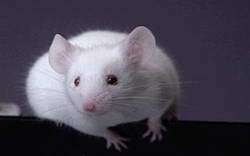December 2, 2013 report
Studies show memories in offspring may be impacted by parental experiences

(Medical Xpress)—Two new studies suggest that events that transpire during the life of a mouse may have an impact on memory mechanics in their offspring. Both studies were conducted by teams in the U.S. and both have had their findings published in the journal Nature Neuroscience.
In the first study, the research team found that mice that were taught to experience fear in conjunction with a certain odor, passed that fear on to their offspring—they too experienced fear when smelling that odor. Further research revealed that the fear factor was passed by the father's through their sperm. In the second study, the research team found that mice that lacked a certain protein in their breast milk, produced offspring that had a far greater capacity for learning new things and remembering them.
The first study has opened the door to a possible explanation of phobias in animals, including humans. If a man has a particularly unpleasant experience with a spider, for example, he may unknowingly experience a change in his genes that are passed on to his offspring, which cause them to fear spiders, seemingly without good reason. To learn this, lab mice were given foot shocks when experiencing the scent of a certain flower teaching them to experience fear when smelling it. Subsequent offspring exhibited a similar fear upon smelling the odor, despite not even being conceived when the initial event occurred. A closer look revealed that the DNA of the mice wasn't changed, just markers related to memory. The researchers found that the offspring produced a third generation of mice that also feared the smell, indicating just how dramatic a single event can be.
The second study involved studying the breast milk of mice and cognitive and memory skills of their offspring. The researchers found that if a protein called tumor necrosis factor (TNF) is missing in female mice, the breast milk they provide their offspring leads to larger than normal hippocampus' and because of that pups that are better at making their way through a maze, and then later remembering how they did it. TNF is normally present in mammals as part of the immune system—they cause cytokines to be produced which are immune response triggers. The researchers are not able to explain how or why the pups would have greater cognitive abilities at the expense of a healthy immune system, but note that nature likely has a reason for it.
Taken together, the studies indicate that there is a lot more to be learned about how memory works in mammals and that much more work needs to be done to gain a better understanding of it and perhaps use what is learned to treat memory disorders or phobias.
More information: 2nd study paper: Maternal hematopoietic TNF, via milk chemokines, programs hippocampal development and memory, Nature Neuroscience (2013) DOI: 10.1038/nn.3596
Abstract
Tumor necrosis factor α (TNF) is a proinflammatory cytokine with established roles in host defense and immune system organogenesis. We studied TNF function and found a previously unidentified physiological function that extends its effect beyond the host into the developing offspring. A partial or complete maternal TNF deficit, specifically in hematopoietic cells, resulted in reduced milk levels of the chemokines IP-10, MCP-1, MCP-3, MCP-5 and MIP-1β, which in turn augmented offspring postnatal hippocampal proliferation, leading to improved adult spatial memory in mice. These effects were reproduced by the postpartum administration of a clinically used anti-TNF agent. Chemokines, fed to suckling pups of TNF-deficient mothers, restored both postnatal proliferation and spatial memory to normal levels. Our results identify a TNF-dependent 'lactrocrine' pathway that programs offspring hippocampal development and memory. The level of ambient TNF is known to be downregulated by physical activity, exercise and adaptive stress. We propose that the maternal TNF–milk chemokine pathway evolved to promote offspring adaptation to post-weaning environmental challenges and competition.
© 2013 Medical Xpress



















